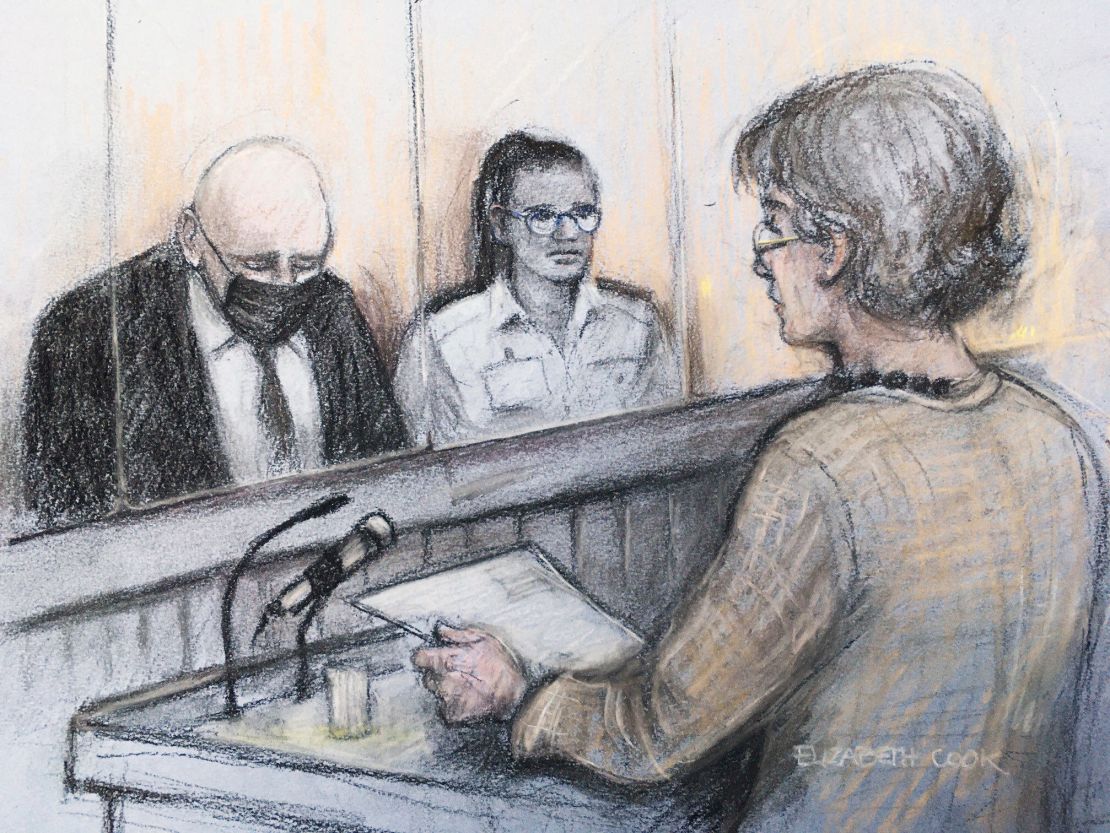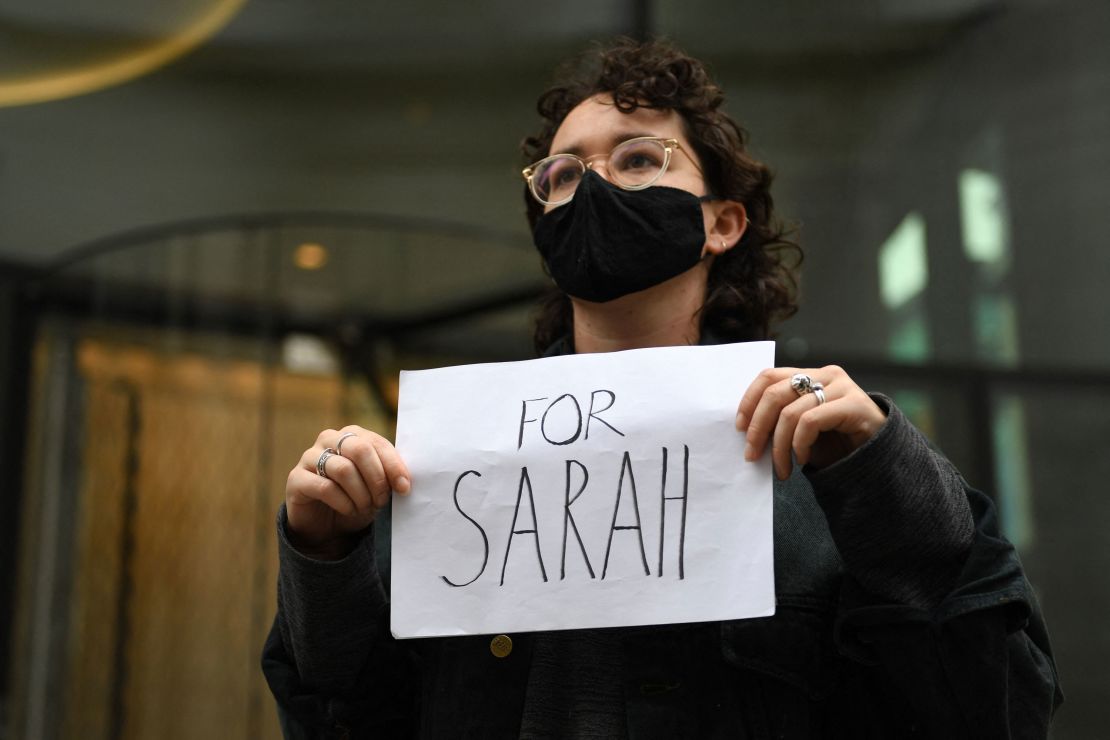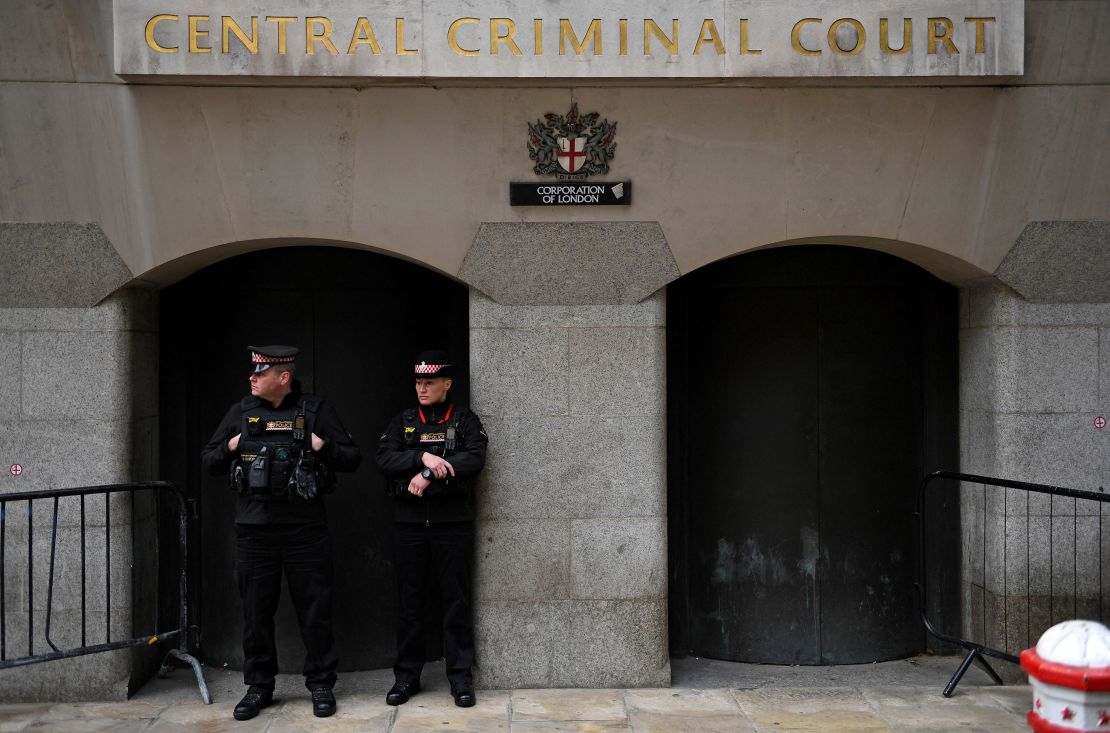A British police officer has been sentenced to life in prison without parole for the abduction, rape and murder of Sarah Everard, a case that sparked outrage and a national debate about violence against women.
Prosecutors said Everard was walking to her London home on March 3 when Wayne Couzens used his police identification and handcuffs to deceive her into getting in his car under the pretense that she had violated Covid-19 rules. He raped her and strangled her with his police belt later that evening.
Couzens was sentenced Thursday to a whole-life prison term, which is very rare in the United Kingdom and reserved for exceptionally serious crimes. It means the defendant is never considered for parole.
Delivering the sentence in front of a packed courtroom, Lord Justice Adrian Fulford described Everard, a 33-year-old marketing executive, as a “blameless victim of a grotesquely executed series of offenses” and called the case “devastating, tragic and wholly brutal.”
The judge added that Couzens, 48, had spent the entire evening of March 3 “hunting a lone female to kidnap and rape.” Couzens was fired from London’s Metropolitan Police in July, days after he pleaded guilty to Everard’s kidnap, rape and murder.
“You have irretrievably damaged the lives of Sarah Everard’s family and friends … you have eroded the confidence that the public are entitled to have in the police forces … you have utterly betrayed your family,” the judge said in his sentencing remarks.
Standing in the dock, Couzens kept his head bowed and his eyes closed, as he had done throughout the whole two-day sentencing hearing. The judge made a point of criticizing Couzens’ behavior in court, saying he had seen “no evidence of genuine contrition on your part as opposed to evident self-pity.”
Everard’s parents Jeremy and Susan, her sister Kate, and many of her friends were in court at London’s Old Bailey – the central criminal court of England and Wales.
A life sentence is mandatory in murder cases in the UK, but it is usually up to the court to decide the minimum length of time to be served before the possibility of early release.
Couzens’ whole-life term is exceedingly rare. According to data from the UK Ministry of Justice, there were only 60 whole-life prisoners in the UK as of June 2021, out of nearly 7,000 inmates serving life sentences.
Couzens’ defense lawyer Jim Sturman QC failed to convince the court that the crimes didn’t meet the test for the imposition of a whole-life prison term. He argued there were several mitigating factors, including Couzens’ early guilty plea and what he said was genuine remorse, his underlying depression and the lack of prior convictions.
“He is filled with self-loathing and abject shame, as he should be,” Sturman told the court shortly before the sentence was delivered.

Everard went missing on the evening of March 3 after leaving a friend’s house in Clapham, south London. Her remains were found days later in woodland near Ashford, Kent – more than 50 miles from where she was last seen.
Couzens was later arrested at his home in Kent, close to where Everard’s body was found. Due to his guilty pleas there was no trial, but the sentencing hearing over the past two days was an opportunity for the prosecution to present the facts of what happened in March and for Everard’s family to read impact statements.
Prosecutor Little summarized Couzens’ actions as “deception, kidnap, rape, strangulation, fire.” Little also detailed what eyewitnesses to the kidnapping on March 3 saw, saying they observed Couzens handcuff Everard, who appeared compliant and had her head down. They thought he was an undercover police officer arresting a woman.
Everard was alive for hours after her kidnapping, and was moved to Couzens’ own car later that evening, the prosecutor said. “In order to have done so and without her escaping or trying to escape or make a noise, it can be inferred that he, at least, must have threatened her,” Little told the court. Prosecutors believe Everard died around 2.30 a.m. on March 4, several hours after she was kidnapped by Couzens.
Everard’s family was given the opportunity to speak in court on Wednesday, demanding that Couzens, who spent the hearing with his eyes closed and head bowed, look at them while they read their statements.
Sarah’s mother, Susan, said her daughter “spent the last hours on this earth with the very worst of humanity. She lost her life because Wayne Couzens wanted to satisfy his perverted desires … He treated my daughter as if she was nothing and disposed of her as if she was rubbish. I am haunted by the horror of it.”
Everard’s family said they were “pleased” with the sentence handed to Couzens. “Nothing can make things better, nothing can bring Sarah back, but knowing he will be imprisoned forever brings some relief,” they said in a statement.

Epidemic of violence
Everard’s disappearance prompted an outpouring of grief and rage across social media from women sharing their own experiences of sexual assault, while also shining a light on the epidemic of violence against women and girls in the UK.
“You have very considerably added to the sense of insecurity that many have living in our cities, perhaps particularly women, when traveling by themselves and especially at night,” Lord Justice Fulford also told Couzens during the sentencing.
One woman is killed by a man on average every three days in the UK, according to data from the Femicide Census, an organization that tracks violence against women and girls. The group argues that the government’s new strategy to curb such violence “shamefully ignores” victims of femicide.
The government promised to take action to tackle violence against women and girls, but activists and the opposition say the steps it proposed were not adequate.
The murder of elementary school teacher Sabina Nessa earlier this month convinced many that nothing has changed since Everard was murdered six months ago.
The man accused of murdering Nessa, Koci Selamaj, also appeared in the same court as Couzens later on Thursday. Prosecutor Alison Morgan said the murder was a “premeditated and predatory” stranger attack and that Selamaj inflicted “extreme violence” on Nessa, PA Media reported.
Selamaj was remanded in custody and a plea hearing has been set for December. His lawyer Aidan Harvey has previously indicated Selamaj would plead not-guilty, PA reported.

London’s Metropolitan Police force has also faced a barrage of criticism for their actions in the days after Everard’s disappearance.
Women were reportedly warned by police officers not to venture out alone as they made door-to-door inquiries on the case, prompting some to comment that this approach only fueled the culture of victim blaming.
Meanwhile, the police regulator, the Independent Office for Police Conduct (IOPC), is investigating whether the Met responded appropriately to a report that Couzens indecently exposed himself at a South London fast food restaurant in February. The IOPC is also investigating alleged failures by Kent Police to investigate another indecent exposure incident linked to Couzens from 2015.
Speaking outside the court on Thursday, the Met Police Commissioner Cressida Dick said Couzens had brought shame on the police. “There are no words that can fully express the fury… and sadness that we all feel about what happened to Sarah. I am so sorry,” she said.
CNN’s Tara John, Laura Smith-Spark, Kara Fox, Livvy Doherty, Allegra Goodwin and Schams Elwazer contributed reporting.























